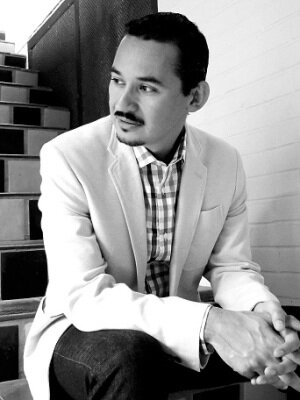 Gary Dop. Photo credit: Parker Michels-Boyce
Gary Dop. Photo credit: Parker Michels-Boyce
I have the folks at Rain Taxi to thank for introducing me to Gary Dop, who after shaking hands said “yes” to an interview, told me about his poetry, and within minutes had charmed me into buying a copy of his book, Father, Child, Water ( Red Hen Press, 2015). As I was interviewing him, I saw how this was so. In Gary’s searching poems about fatherhood, masculinity, and history, I found the same warm, vulnerable human pulse that had thudded through our first conversation. For the speaker’s refusal to let himself off easy, for its equal parts introspection, tenderness and grappling with hazard, “Little Girl, Little Lion” is a poem for anyone who’s ever loved a child. In our unedited conversation, the child inside of Gary was also on full display: he aimed to work in the words “Tupperware," “Braunschweiger,” and “Portuguese Man-of-War”, then did so with finesse. – HLJ
===
Throughout your book FATHER, CHILD, WATER there’s the theme of parenthood, but also this wider lens on your family’s history, the world’s wars, things such as your father’s passion for hunting. Violence, or at least the possibility of violence, seems to loom over even your most playful poems. I think that’s especially true here – the poem’s last line landed cold in my spine.
This might surprise you, but the themes of violence and the darkness in the humor weren't apparent to me in the composition phase.
On one level, I could understand that these things were happening along the way, but I didn't recognize that I was returning to them (or that they were returning to me). My life has been a regular interaction with fear and uncertainty, and the final line of the poem is a reminder of that. I remember being struck by the final line, not knowing how to make sense of it when I wrote it, knowing that it mattered as a larger statement about my daughter (the poem is born of a real experience), and about all daughters, and about me and other fathers. Humor for me has always been a way to connect with people, but when I turn to writing, I think it also became a way to say, "I, too, feel shaken in the world. I, too, need to connect with others who will not hurt me, who want to walk together.”
===
LITTLE GIRL, LITTLE LION
From the stool above our soaking dishes, she proclaims,
I can never be a poet, like it’s written on a sacred stone
In her identity’s medieval cathedral. I am her father.
She does not turn to me. Why? I ask, pulling wrinkled hands
out of the suds we share. The blue glass she’s holding slips
under the water to a hollow clank. Touching her wet elbows,
I hear, Daddy, girls can’t be poets. I’ve never thought
about how my daughter mirrors herself in Mommy
who doesn’t write. I say the right things, pull her away
from the sink to the floor, and bend to look in her
searching eyes, brown like her mother’s. They ask, Are you
sure? I rush away to find Bishop, Rich, Sexton, Dickinson –
any girl on the shelves above Where the Wild Things Are.
Showing her the stack, she pulls out Plath and opens to
“Daddy.” I snatch the book back like it’s rat poison.
Again, I can’t be trusted. Can I be trusted? How can I
wrecking-ball the commandments she’s constructed? I read
the opening stanza which ends in a sneeze,
and she’s satisfied. More Sylvia later, I say. Oh Darling,
you’ll be whatever you need to be, and if it’s Poet,
the world will learn to welcome your wild words, cathedrals
will crumble, stars supernova, and nothing
that pretends will remain – but your words are water,
your life a metaphor only you complete. I say all this,
our backs resting against the cold oven.


